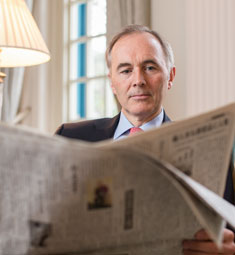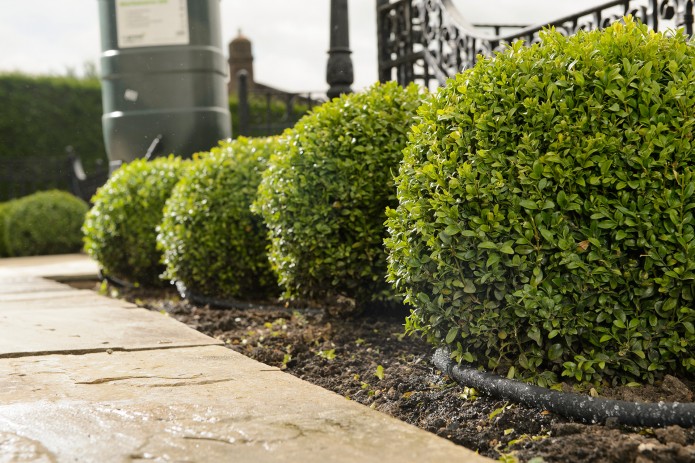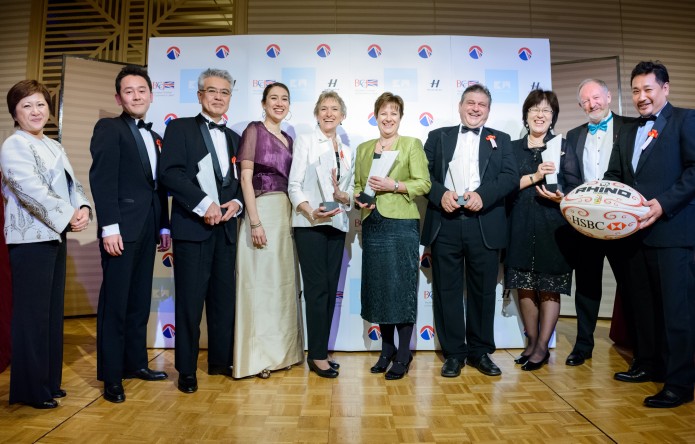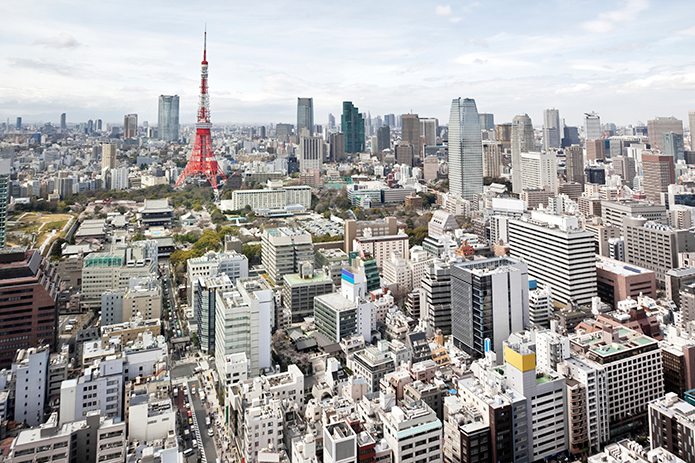
Knowing the daily news in Japan is a key part of the British ambassador\’s job.
Job Brief: pursuing British interests in Japan
Photos: Taro Irei
The UK and Japan share a curiosity and appetite for each other’s products, services and culture, says London’s recently appointed chief diplomat to its “closest partner in Asia”. He is busy promoting modern Britain’s creativity, diversity and ability to deliver.
Please briefly tell us about your career and personal life.
I’ve been something of a jack-of-all-trades. I took up my appointment as British ambassador to Japan in December last year. I joined the Foreign & Commonwealth Office (FCO) straight from university in 1983, and my first posting was to Japan, during the boom years.
Since then I have worked on Asian, European and African issues, and have been posted to Pakistan, Afghanistan and France. I spent four fascinating years seconded to Buckingham Palace as assistant private secretary to the queen. For the past three years I have been FCO director for Africa, looking after countries as diverse as South Africa, Mali and Somalia.
My wife, Sara, and I have one daughter and one son—both now studying at university.
You were based in Japan before. How was it?
I’ve lived in Japan three times before. First, as a high school student in the late ’70s (my father was the naval attaché here, selling Rolls-Royce engines to the Japan Maritime Self-Defense Force). Second, in 1980 I took a gap year and lived with a Japanese family in Tokyo for six months. And finally, my first posting to Japan (1985–1989).
How was it? Life changing. I don’t think, without that early contact, I would have joined the Foreign Office or be doing what I am today.
What are the main challenges you expect to face in Japan?
There are three key tasks, following on from Prime Minister David Cameron’s visit last year: sustaining the rhythm of Japanese investment in the UK, so crucial for British jobs; working on the range of nuclear and energy issues, be it providing commercial support or institutional advice; and building up security and defence co-operation, with an eye both to commercial opportunities and a bigger UK presence in Asia.
These are three areas that Minister of State for the Foreign & Commonwealth Office Hugo Swire discussed during his visit to Japan in January, when he opened talks with the new Japanese government’s Ministry of Foreign Affairs.
I want to further these discussions; the UK has a key role to play with Japan.
But there are plenty of other tasks, too. It’s critical we support UK businesses of all kinds in Japan, large or small. There are new opportunities arising every day; for example, in offering Japanese companies security advice when they operate in difficult environments such as North Africa.
So it’s getting the balance between established relationships and shifting sands. It is interesting to return to a Japan during a period of immense change and development in the Asia–Pacific region.
In less than a decade, we have moved from a G8 to a G20 world, in which economic and security power relationships shift quickly.
What opportunities and threats might China offer? Indonesia is a rapidly developing democratic nation. Burma is taking important but tentative steps that Japan and the UK both want to support.
Within this context, the UK and Japan’s long history as key partners is of renewed importance. Prime Minister Shinzo Abe—who has spoken to David Cameron at least three times in the last six weeks—always stresses shared values. This provides the opportunity to work together on shared challenges.
How can UK–Japan business and cultural ties be strengthened?
The UK and Japan share a curiosity and appetite for each other’s products, services and culture—something we are striving to strengthen, after 2012 showcased modern Britain’s creativity, diversity and ability to deliver.
With eyes now on the selection for the 2020 Summer Olympic Games, the UK stands ready to offer its experience and expertise should Tokyo be selected over Madrid and Istanbul later this year.
I’m in close contact with Tokyo Governor Naoki Inose—we even follow each other’s Twitter feeds (Follow Tim@UKAmbTim)!
Many Japanese people travelled to the UK for the London 2012 Olympic and Paralympic Games, and I want more to visit the UK to experience the dynamism in all aspects of British life—be it the diversity and quality of modern British food, or the best of Britain’s creative industries.
I want more Japanese students to study at our world-class educational establishments, to learn the skills necessary to achieve in this globalised world. I want more Japanese businesses to set up in the UK and to benefit from our multicultural, multilingual modern workforce.
One great example: I’m delighted that Zaha Hadid, the Iraqi-born British architect and designer of the London Aquatics Centre, has won the competition to design Japan’s new national stadium in Tokyo. It will be a superb testament to our co-operation.
Will you be asking the Japanese government to make it easier for British firms to trade here?
Japanese companies recognise the UK as a great place to invest, and we are supporting Japan’s efforts to do the same. This will be on the agenda when the UK hosts the 2013 G8 Summit, which will focus on key themes of trade, transparency and tax.
Working with our counterparts in the Japanese government, we want to see the development of open economies, open governments and open societies that can unleash the power of the private sector. I make these points in all my opening calls on cabinet ministers.
Negotiations towards an EU–Japan Economic Partnership Agreement, starting here in March, will be very important. The UK has been a great advocate of this agreement.
The removal of tariff and non-tariff barriers could deliver over €40bn of additional European exports to Japan and more than €50bn of additional exports from Japan to the European Union. We’re making free trade agreements a centrepiece of the UK G8 summit—which Prime Minister Shinzo Abe will attend—in County Fermanagh in June.
Which industries in the UK have the most potential for increasing their business with Japan?
Japan is now looking at renewable energy as a serious provider, following the 2011 Tohoku earthquake and tsunami almost two years ago, with a nominal target of 30% renewable energy.
This shift in Japan’s energy-mix is opening up fresh opportunities for UK and international companies, particularly in low carbon energy generation using, for example, offshore wind, solar PV and biomass.
UK strengths in renewable technologies and low carbon power generation are well understood in Japan, and we are rightly seen as a world leader.
The safe and secure delivery of the 2012 London Olympic and Paralympic Games was a showcase in Japan for the UK security industry. With Japan hosting the 2019 Rugby World Cup and in the running for the 2020 Summer Olympic Games, there are real opportunities for UK security services, products and solutions.
Japan remains one of the largest financial-services markets in the world, and has the largest accumulation of personal wealth in the world, amounting to £11.5trn. The top 50 institutional investors have over $12trn worth of assets by themselves.
UK–Japan asset management seminars are held at the British Embassy Tokyo to help assist UK companies wishing to access these funds managed in Japan.
In addition, Japan is Asia’s leading pharmaceutical market and the world’s second-largest market. Changes in the market environment, together with an ageing population, are resulting in rising drug demand, especially in the generic and biotechnology sectors.
There are some 450 UK companies with operations in Japan and we are still seeing an enormous amount of British business interest in the Japanese market. We would like to see this increase.
The UK Trade & Investment team at the British Embassy Tokyo and Consulate-General in Osaka are always ready to offer assistance to UK companies.
Are there any non-business-related advocacy issues you would like to take up with Tokyo?
One of our jobs in the embassy is to support British nationals in difficulty.
Disputed child custody cases are among the most distressing that we deal with. I’m very keen for the Japanese government to ratify the Convention on the Civil Aspects of International Child Abduction as soon as possible, to provide a framework for those custody issues to be resolved.
After previous legislation fell away, we lobbied the new government early in January to ratify the convention. So I was pleased to learn that a bill to this effect is being submitted to the Diet. We remain committed to working with Japan on finding ways to resolve existing cases.
Which well-known people do you most admire?
I tend to admire people who are very different to me: those who operate alone, act against the odds, or challenge authority. For example, the early British campaigners against the slave trade in Africa. Or entrepreneurs—like Hiroshi Mikitani, whom I met in January; I could never do what they do.
What are your personal weaknesses, strengths, likes and dislikes?
I have a weakness for chocolate. I am strongly attached to my home county, Devon. I like throwing myself into different and difficult environments.
Dislikes? I don’t really like cynicism; I’m much more of a can-do person.
How would you explain your job and official duties?
My job is to pursue the British interest in Japan, wherever that may be. Some of that is through specific lobbying or negotiation: creating a context for more defence sales; clinching an investment in the UK; identifying a new market opportunity.
Some of that is softer: building relationships with the major decision-makers in Japan, to use when occasions arise; introducing the best of British culture to Japan, be it [British Romantic landscape painter, water-colourist and printmaker JMW] Turner from Tate Britain, or young British talent (I’m not sure if the recent One Direction visit counts).
It’s also important to offer British ministers a fair and judicious view of what is happening here, particularly when media reporting becomes shrill.
Last but not least, I need to ensure that the network in Tokyo and Osaka is motivated and high performing in order to be the best diplomatic mission in the world.
Which UK dignitaries can we expect to visit Japan this year?
David Cameron and William Hague recently, and deliberately, described Japan as “the UK’s closest partner in Asia”. So it was fitting that 2012 saw a large increase in the number of high level visits to Japan by the UK coalition government, including those by David Cameron, George Osborne, Jeremy Hunt and Lord Green.
This trend is already continuing in 2013, with the January visit by Foreign Office Minister Hugo Swire—the first European minister to meet the new government—to open bilateral talks with Japan on defence and security co-operation, and to meet with British business leaders.
A number of further visits are planned for the coming months, which we’ll announce in due course. While each senior figure brings with them a particular area of expertise, maximising opportunities for British business in Japan is always at the forefront of their minds.
Any special message to the British community in Japan?
It’s an honour and a pleasure to return to Japan, with which I have a strong personal connection. One of my very first meetings was with the British Chamber of Commerce in Japan, and I am trying to call on the top British firms here in my first two months.
It was fortuitous but wonderful that, among my first jobs, was letting BCCJ President Emeritus Philip Gibb and Executive Director Lori Henderson know that they were being honoured in the 2013 New Year Honours list.
I know my trade and investment teams at the British Embassy Tokyo and Consulate-General in Osaka are helping British companies win business, while my consular team is dedicated to maintaining a high standard of services to the public.
I’m very much looking forward to meeting as many of the British community in Japan, in Tokyo and beyond.
I also want to pay tribute to my predecessor, Sir David Warren KCMG, who was tireless in his support for British business and our relationship with Japan. As many of you know, he is now running The Japan Society in London, so he will never be far from our email inboxes.






